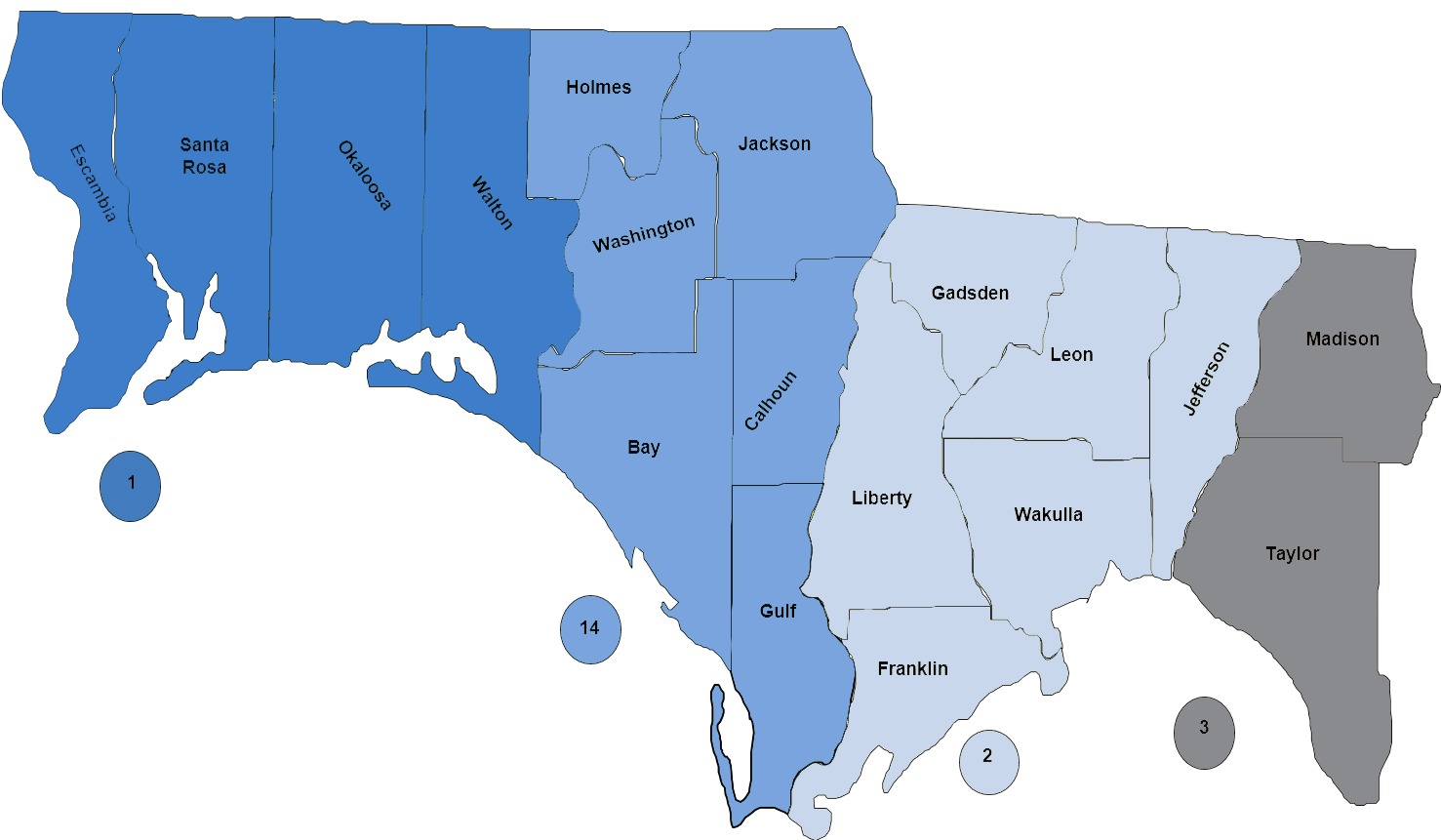
Criminal Justice Initiatives
NWF Health Network’s criminal justice initiatives enhance community well-being by addressing behavioral health needs within the criminal justice system, particularly in rural communities. These efforts reflect our commitment to holistic public health and safety.
Community Outreach Coordinators
In 2021, NWF Health Network partnered with rural sheriff’s offices to launch a pilot program aimed at enhancing resources for law enforcement to better serve individuals affected by substance use and mental illness within the criminal justice system. By the end of 2023, the program had expanded to 11 sheriff’s offices within the network.
The Community Outreach Coordinator program allows a non-sworn civilian to connect incarcerated individuals with behavioral health services upon release, educate the community on behavioral health needs, and establish trusted resources for seeking help, ultimately mitigating the criminality associated with behavioral health issues.
Circuit 2: Franklin, Gadsden, Jefferson, Liberty, & Wakulla counties
Circuit 3: Taylor County
Circuit 14: Bay, Calhoun, Holmes, Jackson, & Washington counties
Mobile Response Teams
In an effort to support the effectiveness of Mobile Response Teams (MRTs), NWF Health Network partners with 13 rural sheriff’s offices to connect members of the community to on-site crisis support services through collaboration with behavioral health providers.
MRT provides on-site assessment, support, and resources for rural individuals in crisis who may need mental health stabilization but can be averted from in-patient care or hospitalization. Law enforcement initiates MRTs when responding to mental health crisis-related calls for service.
Circuit 1: Walton County
Circuit 2: Franklin, Gadsden, Jefferson, Liberty, & Wakulla counties
Circuit 3: Madison & Taylor counties
Circuit 14: Calhoun, Gulf, Holmes, Jackson, & Washington counties
Behavioral Health Transport
Rural counties in NWF Health Network’s service area face challenges with behavioral health crisis transportation due to their vast size. Law enforcement officers often spend hours transporting individuals to distant receiving facilities, reducing their availability for other duties.
NWF Health Network proposes using off-duty law enforcement officers for these transports, offering financial reimbursement to ensure public safety and maintain service levels. This approach aims to improve outcomes through trained de-escalation techniques and provide a formal standard of care.
Circuit 1: Walton County
Circuit 2: Franklin, Gadsden, Jefferson, Liberty, & Wakulla counties
Circuit 3: Madison & Taylor counties
Circuit 14: Calhoun, Gulf, Holmes, Jackson, & Washington counties
SMART Meth Prevention
While the rates of methamphetamine usage nationwide have decreased in the last decade, use in rural north Florida communities has increased as the drug has become less expensive and easier to acquire.
The SMART (Stopping Methamphetamine Among Our Teens) prevention program includes in-school curriculum for middle and high schoolers with messages specifically oriented to how teenagers in rural communities view drug usage.
Circuit 2: Franklin, Jefferson, & Liberty counties
Circuit 3: Madison & Taylor counties
Circuit 14: Calhoun, Holmes, & Washington counties
In-Jail Telehealth
NWF Health Network has partnered with Access Discount Health Care (ADHC) to offer behavioral health assessments and outpatient therapy to connect licensed therapists with inmates in local rural jails via telehealth.
This partnership seeks to provide essential mental health care to incarcerated individuals and reduce recidivism in doing so. The partnership seamlessly incorporates mental health support into the existing correctional infrastructure to ensure no inmate is left behind in their journey towards better mental well-being.
Circuit 2: Franklin County
Circuit 14: Bay County
Fatherhood Initiative
NWF Health Network Fatherhood Initiative partners with the Florida Department of Corrections Office of Community Corrections to collaborate on the Fatherhood Initiative. The Office of Community Corrections currently supervises almost 19,000 offenders throughout the NWF Health Network service area. Fatherhood Initiative Peers have also been embedded in the local county jails to provide reentry assistance to incarcerated fathers. These peers assist incarcerated fathers, as well as fathers involved in the child protection system, with interactive journaling, reentry planning, and addressing behavioral health needs, with the hope of reintegration back into the family upon release.
Circuit 1: Escambia, Okaloosa, Santa Rosa, & Walton counties
Circuit 2: Franklin, Gadsden, Jefferson, Leon, Liberty, & Wakulla counties
Circuit 3: Madison & Taylor counties
Circuit 14: Bay, Calhoun, Gulf, Holmes, Jackson, & Washington counties
Certified Recovery Peer Specialist
NWF Health Network offers an opportunity for members of law enforcement to earn a continuing education incentive by becoming Certified Recovery Peer Specialists (CRPS).
Law Enforcement Certified Peers will be able to confidentially refer those that seek help beyond the services of a Certified Peer to a network of licensed mental health providers designed to address the mental health needs specifically of law enforcement officers. The CRPS credential designates competency in the domains of Recovery Support, Advocacy, Mentoring and Professional Responsibilities.
Circuit 1: Escambia, Okaloosa, & Santa Rosa counties
Circuit 2: Franklin, Gadsden, Jefferson, Leon, Liberty, & Wakulla counties
Circuit 3: Madison County
Circuit 14: Bay, Calhoun, Holmes, Jackson, & Washington counties
Leon Criminal Justice Deflection
NWF Health Network has partnered with DISC Village and Jack Campbell, State Attorney for Florida’s 2nd Judicial Circuit, to create a Deflection Program to divert nonviolent offenders from the criminal justice system. This partnership recognizes that substance use disorders and mental health conditions are better addressed through public health than law enforcement.
The Deflection approach prioritizes the wellbeing of individuals and aims to prevent unnecessary harm. The Deflection approach is a community-based strategy that engages individuals and organizations in the community to work collaboratively towards addressing these critical issues.
Circuit 2: Gadsden, Leon, Liberty, & Wakulla counties
Project CALM
The Leon County Sheriff’s Office Mental Health Unit (MHU) is a community-based mobile intervention team intended to ensure rapid and appropriate intervention in behavioral health crises within Leon County. Each MHU Team consists of a Leon County Deputy and a mental health professional employed by Apalachee Center. The teams are dispatched to calls for service involving individuals with mental health or substance use issues. The co-responder team assess the individual(s) and determine the best resources to utilize or social service to provide. The team will also provide follow-up contacts to determine the effectiveness of referrals or if any further services could be provided.
Circuit 2: Leon County
Escambia Co-Responder Unit
The Escambia County Sheriff’s Office has collaborated with behavioral health clinicians from Lakeview Center to improve public health and safety outcomes for individuals with mental health and substance use disorders. The Co-Responder Team will be comprised of behavioral health clinicians and sheriff’s deputies who are trained in advanced crisis intervention and de-escalation techniques. This collaborative approach aims to ensure the safety and well-being of individuals in crisis while providing them with the necessary resources and interventions.
Circuit 1: Escambia County
Okaloosa Diversion Program
The Forensic Pre-Trial Program (FPTP) is a voluntary condition of bond accountability program for participants actively involved in recovery having been diagnosed with a mental health condition or co-occurring mental health and substance use conditions. The purpose is to reduce incarceration by utilizing community-based behavioral health interventions.
Services include needs assessments, service referrals, case management, outpatient treatment, psychosocial rehabilitation, self-help and advocacy, recovery planning, health and wellness classes, relapse prevention, and education regarding factors that contributed to the person’s judicial system involvement.
Circuit 1: Okaloosa County
